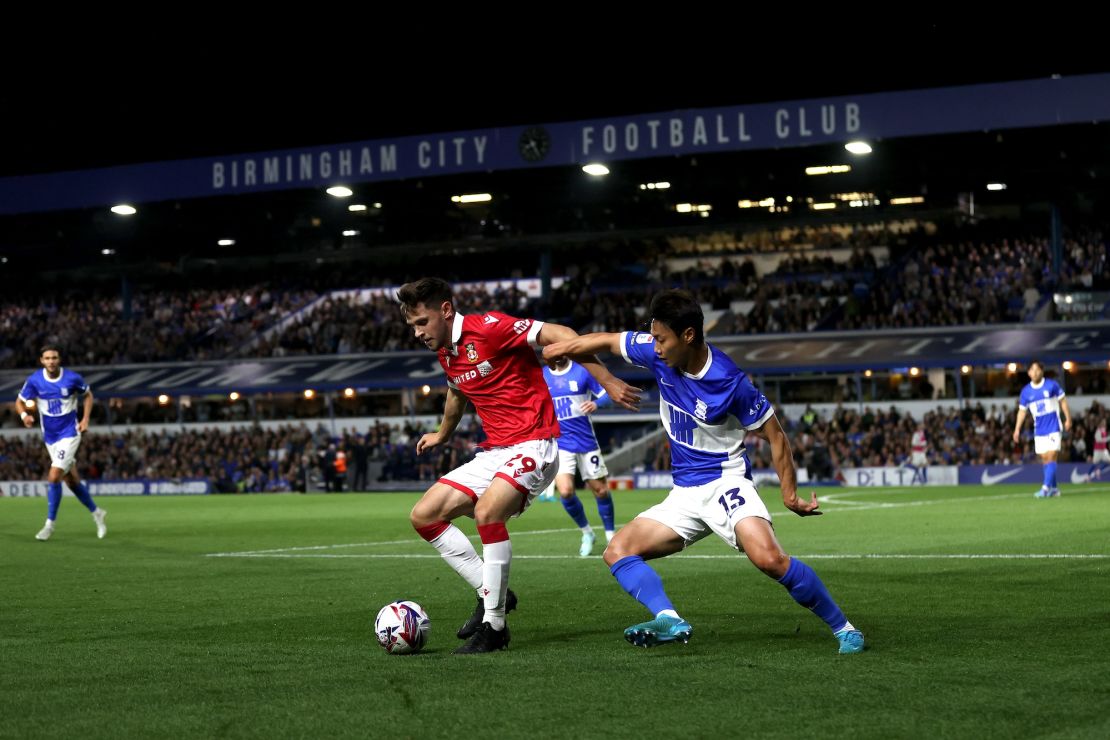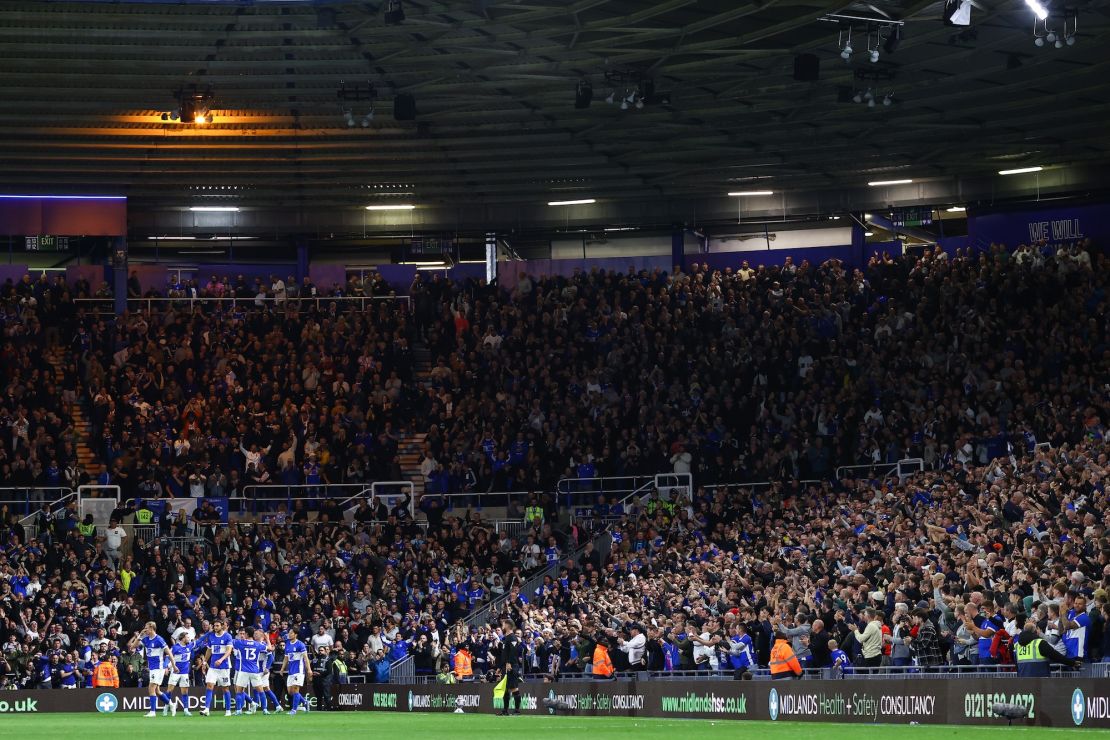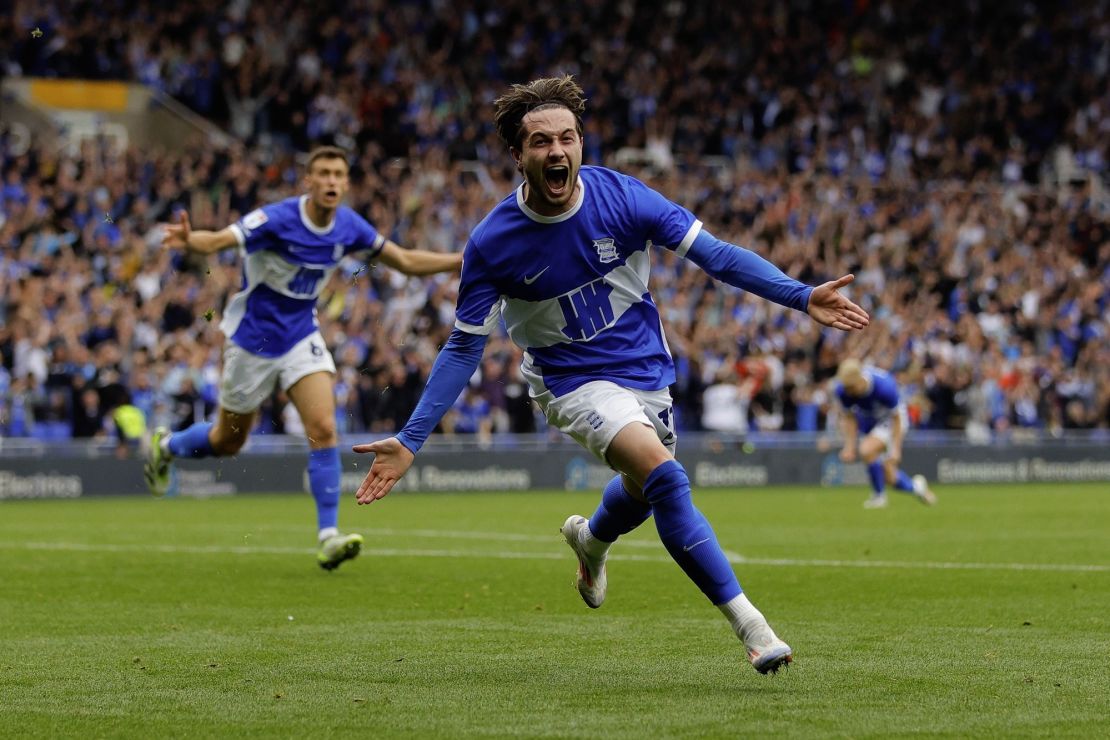But the destination you reach isn’t strictly a place of worship – at least, not in a traditional sense.
St. Andrew’s, the stadium that greets you at the end of this journey, stands tall. It has been home to soccer club Birmingham City FC for more than a century. The Blues – as the team is known – are beloved in this part of the city and have been since they were founded as the Small Heath Alliance in 1875.
Above the ground, three flags fly high. Two of them you might expect to find at this stadium; one bears the club’s crest and the other the St. George’s cross that adorns the national flag of England. But the third – the famous stars and stripes of the United States – is more surprising.
The US flag has been flying above St. Andrew’s for more than a year now, ever since the beleaguered Birmingham City was taken over by the American-based Knighthead Capital Management, which counts NFL legend Tom Brady as a partner in its ownership of the club.
Knighthead co-founders Tom Wagner and Brady have, from across the pond, promised to rejuvenate the club both on and off the pitch.
With them, the ownership has brought a sunny sense of optimism which often feels unique to Americans. Brits, in particular British soccer fans, are not usually known for their positivity. And, until recently, Bluenoses – the nickname for Birmingham’s loyal fans – haven’t had very much to feel hopeful about.
“There is something of a culture clash happening here,” lifelong Birmingham fan Daniel Ivery told CNN Sport. “A lot of people don’t like change. I, myself, don’t especially like the Americanization of the sport. I hope we won’t start playing music after we score!”
But while there is resistance to change, there is widespread acknowledgment that fresh ideas are needed.
The team has not played in the Premier League – the top level of English soccer – since the 2010-11 season.
The club has also come close to financial ruin several times between 2011 and 2023 and paid the price for mismanagement under previous owners – most notably a transfer embargo and a nine-point deduction in 2019.
The sale of the club’s greatest-ever academy product, England and Real Madrid star Jude Bellingham, to Borussia Dortmund in a deal reported to be worth $38 million (£30 million) in 2020 helped to relieve some of the anxiety around the club’s financial situation. It’s now bidding for a brighter future.
In the 15 months that have passed since Wagner and Brady bought the club, though, the team’s fortunes have been mixed.
In the first season under the new ownership, Birmingham was relegated to the third division of the English game. That season was fraught with controversy, not least the decision to fire popular head coach John Eustace and replace him with former Manchester United and England star Wayne Rooney.
The Rooney experiment, although audacious, didn’t work, and although Birmingham fired the former striker in January, the damage had been done and the team was destined for relegation.
Now, instead of playing against the biggest teams in the country, Birmingham is in the third tier of English soccer, putting pressure on the club’s glamorous owners to see about change.
On the one hand, the global profile of the team has certainly been raised under the new ownership.
In September 2024, St. Andrew’s saw one of the most star-studded nights in its history as Brady was joined in the stadium by the likes of David Beckham, actor Rob McElhenney and other A-listers to watch the Blues take on Wrexham – another club in the lower leagues that knows what it’s like be taken over by a few wealthy Americans.
Birmingham won that match, which has now been dubbed the “Hollywood Derby.”
The reverse fixture, held at the Racecourse Ground in Wrexham, is expected to be so popular in the US that the match is set to be broadcast in “immersive entertainment: venues in both Los Angeles and Dallas, which “simulates the experiences of audiences attending the stadium ground. There is said to be limited availability due to the game’s expected popularity.

Ivery, a lifelong fan of the club, has written a book about its tumultuous recent history. Despite the team’s low league position, he remains optimistic that the new owners can have a positive influence.
“We’ve been relegated, but there’s hope,” Ivery told CNN. “And that’s something that people here haven’t had for a long time.”
The sheer level of investment in Birmingham City so far by Knighthead Capital, which included smashing the League One transfer record after signing Jay Stansfield in a deal worth up to £15m (roughly $18.48 million), has given Ivery confidence in the owners. And despite the misstep of appointing Rooney at a crucial moment for the club, he is certain that Wagner and Co. have learned their lesson.
He’s backing the owners to lead the Blues straight back to the Championship – Birmingham currently sits top of the third division – and then to the Premier League.
Price of success
But while excited by the scale of the new owners’ ambitions, Ivery also urges caution. He has no desire to see Birmingham City’s traditions swept aside in favor of appeasing new fans and followers, who have been introduced to the club by its wealthy American owners.
Earlier this season, for example, following the sold-out home game against Wrexham, Birmingham City CEO Garry Cook revealed that he thought the possibility of the match being played in the US was a “great idea.”
That there was even a consideration that a competitive Blues match might be played abroad was met with fury from some fans. For many, the very idea was insulting and represented an abandonment of loyal fans in Birmingham who can’t afford to fly out to the United States.
“There has to be care taken not to alienate the fans that have been there from the very beginning,” Ivery said. “You can’t just disconnect from them to court new ones.
“From some older fans, there is a nostalgia for the terraces of the past and even for the uncomfortable seats and that sort of roughness around the edges of the ground,” he added.
“But that’s in the past now. We’ve got to be about the future. Those who wear sepia-tinted glasses are fading away and will eventually become a minority within the club.”
Wagner, in an open letter in 2023, said he wanted fans “involved in the journey with us” and said he understood that the club was “part of the social fabric of a great city that is now in the ascendancy.”
CNN has reached out to Birmingham City for comment.
City in need of help
The club’s new owners have made grand promises about transforming the club and the surrounding area, with plans for a ‘Sports Quarter’ which would be home to a revamped stadium, a training ground, and an “eatertainment” hub.
“Eatertainment” is a phrase coined by Wagner to describe a combination of restaurants, sporting complexeds, and entertainment.
But, for now, there is still a ruggedness around Birmingham City, and that authenticity provides a sense of romanticism among some fans.
The understated pubs surrounding the stadium boast a clientele which is exclusively made up of loyal, local fans on matchdays. In many ways, it’s an essential part of the experience.
Many of these pubs rely on Bluenoses to bring in revenue at the weekend but, according to some fans, things are changing. Some say that more and more match-goers have taken to spending the hours before games at the stadium and doing their drinking there, rather than in pubs.
The club, though, says its aware of its role in supporting the local community.
“We understand the Club’s pivotal role for the city, economically, socially and culturally. We plan to be a cornerstone; a positive force in the local community where we operate,” Wagner said in his open letter.

Debbie Fletcher is a Blues fan who knows all about the importance of tradition. A loyal, match-going Bluenose, she’s barely missed a game in the last 40 years, traveling far and wide to follow her beloved Birmingham City.
She’s upbeat about the Blues. Despite relegation last season, she tells CNN Sport that “the feeling has never been this good.”
The new owners, she adds, have “come in full of life” and, although she and others wondered whether they would stick around when Birmingham City tumbled into League One, she says she’s now confident that they are here to stay.
But she’s wary, too, of the pitfalls that can come with sudden success and tells a cautionary tale about another club that found itself propelled from mediocrity to global popularity following a takeover by wealthy backers.
“Manchester City used to have an incredibly passionate, vocal fanbase in the past,” Fletcher said. “And it feels a little bit like that’s been lost, now that there’s so much demand for tickets to see one of the best football clubs in the world. Their stands used to be full of fans that had followed them for years and that isn’t the case anymore.”
While the Blues aren’t quite at the same level as the treble-winning, Abu Dhabi-owned Manchester City, Fletcher has already noticed a rise in new fans flocking to St. Andrew’s, not to mention NFL legend Brady, who flies across the Atlantic just to watch games through his aviators.
Just one look around the local area, with its forgotten factories and its imposing metal structures, tells you that this is a place built by working people.
And Birmingham’s large working-class population, including Fletcher, don’t want to entirely lose the club they fell in love with.
“All of a sudden, every man and his dog want a ticket!” Fletcher said. “And as the spotlight on us gets brighter, a lot of our games are being moved so that they can be shown on TV. While that’s wonderful, it means that match-going fans are having to change their plans quite a bit to accommodate the new supporters.
“And it isn’t cheap to rearrange travel to matches. You’ve got Bluenoses that already pour so much of their money into the club and, now, they could be losing out.
“We’re a working man’s club. And I just hope that we don’t lose that core, even as we grow and even if we make it back to the Premier League again someday. I know the owners will be seeking more modern supporters and more commercial success, but I don’t want us to forget who we are and who Birmingham City represents.”

However, there is an acknowledgment that glossy American investment in the club, despite its potential to price out local fans, could be exactly what the city needs.
After London, Birmingham is the most populous city in the UK. And yet, its development is stagnant in comparison to the capital and northern powerhouse Manchester.
Some parts of the city’s huge center, especially those near St. Andrew’s, appear increasingly deprived. Disused and rundown buildings are a common sight, while unfinished and unstarted building projects can be found across the city.
Historical markers and sources of local pride – such as the oldest working cinema in the UK – have fallen into disrepair. In 2024, Birmingham City Council – the largest local authority in Europe – declared bankruptcy. Since then, there have been cuts to the city’s public sector, along with its art and culture scene, and residents have seen a hike in local taxes.
Wagner, Brady, and Co. are promising not only to reinvigorate a club stuck in mire but to revitalize the city, too. The hope is the club might gain a legion of new fans across the pond who are willing to take the city into their hearts – even if it means letting go of the past.
“This is a big bet on the city of Birmingham,” Ivery said of the Wagner and Brady era. “And we should be grabbing it with both hands.”












